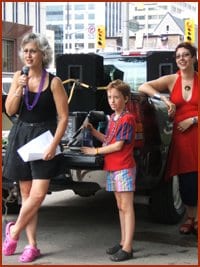Marie Robertson is this gutsy woman who’s been fighting for queer and gender liberation for decades. She lives in Ottawa now and helps coordinate the Lesbian Information Xchange, but for years she was an AIDS activist in Toronto. She’s wise and angry and insightful and sexy and her heart and mind are cranked up to their maximum settings. She’s an Ottawa hero.
Marie sent me a photo from this year’s hugely successful Dyke March (see right, photo by Lucy Chapman). Microphone in hand, she’s making a speech to the 350-plus women gathered at the Human Rights memorial, where she proudly declared herself a middle-aged dyke with no intention of quieting down anytime soon. She reminded the younger women in attendance of just how recently queers were still being fired, evicted, arrested and killed in the nation’s capital.
Next to her is another local hero, Ariel Troster, a Dyke March organizer and a hard-working activist who, like me, enjoys the freedoms hard won by Marie’s generation. And between Marie and Ariel stands Ana, the seven-year-old girl that Marie recently adopted with her partner. Ana loudly celebrated the queer community in both the Dyke March and the Pride Parade this year. Later I saw her getting her groove on at the dance party outside city hall.
On Oct 12, Capital Xtra hands out its annual hero awards recognizing the successes of Ottawa queer activists. When I think of heroes, I think of mentors. People who teach me how to think critically, to love unconditionally, and to speak my truth without shame. They’re also the ones who gently correct and support me when I get it wrong. For me, this photo of Marie, Ariel and Ana is an image of mentorship. It’s an image of wisdom and passion and experience flowing between three generations. It’s an image of how the queer community has managed to grow ever louder and prouder with each decade.
The hero awards are important because they offer a chance to spotlight our charismatic leaders, our innovative thinkers, and our defiant divas. They’re a chance to take stock of the year’s successes and remind ourselves of how tenacious and hilariously fun our community is, surviving and thriving — and looking fabulous doing it! And although the awards focus largely on recognizing high-profile accomplishments, activism tends to be learned through mentorship, and that often happens privately in less noticeable ways.
Take Nicky, a longtime HIV survivor and a backbone volunteer at the AIDS Committee Of Ottawa’s drop-in centre. Nicky’s seen a whole lot: life on the streets, life on drugs, life in jail, and too many lives lost to HIV. Yet every day he’s still laughing and loving and supporting his peers. Nobody knows more about HIV meds and he takes the time to share that knowledge with anyone who asks. He protests in the streets for affordable housing and crack-kit funding and freedom from stigma. And right now he’s hard at it, caring for a lover who is ill. He’s not paid for any of that work. You probably don’t know him, but you’ve likely benefited in some way from his activism. He’s a local hero.
Or like Barry Deeprose, who supposedly retired but is still hard at work as a volunteer. Barry is chair of the Gay Men’s Wellness Initiative (GMWI), working toward a more holistic vision of queer health. For too long, gay men’s health has been defined by mere HIV status, with little thought to what makes for a good life after you test positive or how things like employment, housing and depression might influence health in general. Younger guys like me need the lived experience of longtime activists like Barry to learn how yesterday’s revolution became today’s status quo. It’s how we figure out what comes next.
It’s also how we learn the skills needed to make things happen. Like Julie Allard, the young, local dyke who took her first big plunge into community activism by organizing the women’s stage at this year’s Dyke March. Between performances, Julie made a special point of publicly thanking Elaina Martin, the veteran organizer who created Westfest and who generously offered Julie contacts, advice, and support. Experienced women like Elaina give back to their community by fostering the success of younger women like Julie.
Nicky’s life experience and knowledge wouldn’t do much good if he kept it to himself. Instead, he offers it freely to people who are newly diagnosed. Elaina passes on leadership skills and helps Julie throw a damn good party for Ottawa dykes. Barry sends me articles to encourage my work and to teach me a little more of the gay history they refused to teach me in school.
What makes these folks heroes is not simply that they are unique, but that they’re willing to “do the dishes.” Their sleeves are rolled up and their hands are dirty. And they’re making time for younger generations looking to follow their lead. Intergenerational mentoring is a key reason queers survive and thrive despite the pressure on us not to. And though it’s not the flashiest kind of heroism, it sure as hell saves lives.

 Why you can trust Xtra
Why you can trust Xtra


